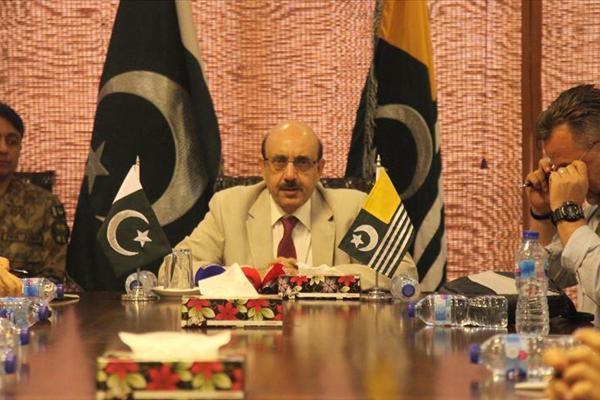Turkey only country that understands, defends Kashmir issue: Azad Kashmir president
Sevil Erkuş- ISLAMABAD/AZAD KASHMIR


The president of the Pakistan-administered Kashmir has praised Turkey, saying the nation has repeatedly raised its voice against international crimes in the conflict zone.
“Turkey is the only country that can understand and defend the Kashmir issue. Turkey’s President Recep Tayyip Erdoğan is loved and respected by Pakistan and Azad Jammu Kashmiris,” Sardar Masood Khan, the president of the Pakistan-administered Kashmir, has told Hürriyet Daily News.
Erdoğan had raised the issue of Kashmir with Indian Prime Minister Narendra Modi in a 2017 visit to New Delhi.
“Turkey, China and Iran are overtly criticizing India. But, the rest of the world remained silent towards India because of the strong nations’ economic and strategic interests,” he said.
Khan also underlined the importance of the United Nations Security Council resolutions, saying the Kashmir issue should be solved in the context of these resolutions.
“The international community should put pressure on the Modi government in India to halt this inhumane situation,” he said.
‘India transformed the region into concentration camp’
India has been carrying out activities in Jammu Kashmir that have violated international law, Khan said.
“During the night operations in Jammu Kashmir, women and elderly are being threatened. The youth is being deforced and tortured. Thousands are under detention. India is carrying out a genocide and committing war crimes by violating international law,” he conveyed.
India has transformed the region into a “concentration camp,” according to Khan.
“Hospitals have become graveyards. Food and medicine stocks have been running short. Jammu Kashmir was previously occupied, but, now, it has become a region of exploitation,” he said.
The Kashmiri president also said that India’s aim is to establish “illegal settlements just like how Israel has been doing in Gaza and the West Bank.”
“Modi announced that he will bring Hindus into the area. The number of soldiers has been increased to 980,000 from 700,000. But at this moment, the number of freedom fighters there is 250,” he said.
“Yet, India is not only fighting against these, it is also fighting against people who do not want to live under Hindu administration,” he added.
Indian soldiers open fire both towards Pakistani soldiers and the civilians, said Mohammad Umar, the section commander of Pakistan Army. He added that hundreds of people have been killed or injured over the years.
The most casualties are caused by cluster bombs that Indian soldiers use, Umar said. He added that Pakistan has been making counterattacks towards the harassing fires.
‘We want plebiscite’
Raja Arif, a teacher who had to migrate from Jammu Kashmir to Azad Kashmir, is currently living with 2,000 migrants just like himself, from Jammu Kashmir, at the Thora camp.
Arif said he has not seen his big sister and his cousins for the last 23 years. With the curfew India imposed on Aug. 5, they also lost their only way to contact: WhatsApp.
“We do not know if they are well or alive. India does not have the right to control Kashmir. They should respect the U.N. resolutions,” Arif said.
“We want a plebiscite. President Erdoğan has a significant impact. We want Erdoğan to be the voice of Kashmir. We want [him] to make us heard in the U.N. and [Organisation of Islamic Corporation] OIC meetings,” he added.
“We have been putting up with this for many years. We no more have any patience. We are even scared to send our children to school. But this is our homeland, we will not leave here,” said a villager from the border village Chakothi.
“We want to cross and stay with our fellow Muslims. Why is the world staying silent to all this? Why have all Muslim countries remained silent? Only Turkey raised its voice,” the villager added.
The conflict over Kashmir has existed since the late 1940s, when India and Pakistan won independence from the British Empire. The countries have fought two of their three subsequent wars over Kashmir, and each administers a portion of the region.
New Delhi initially grappled with largely peaceful anti-India movements in its portion of Kashmir. However, a series of political blunders, broken promises and a crackdown on dissent escalated the conflict into a full-blown armed rebellion against Indian control in 1989 for a united Kashmir, either under Pakistan rule or independent of both. Since then, about 70,000 people have been killed in the conflict, which India sees as a proxy war by Pakistan.
The region is one of the most heavily militarized in the world, patrolled by soldiers and paramilitary police. Most Kashmiris resent the Indian troop presence and support the rebels.
A new generation in Kashmir has revived the militancy, challenging New Delhi’s rule with guns and social media.
For years, human rights groups have accused Indian troops of intimidating and controlling the population with physical and sexual abuse and unjustified arrests. Indian government officials deny this, calling the allegations separatist propaganda.
Abuses alleged by rights groups since 1989 have included rape, sodomy, waterboarding, electric shocks to the genitals, burns and sleep deprivation.
The U.N. last year called for an independent international investigation into allegations of rights violations like rape, torture and extrajudicial killings in Kashmir. India rejected the report as “fallacious.”
